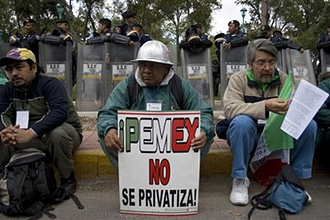
|  |  |  Business News | October 2008 Business News | October 2008  
Mexico Oil Reform Opens Door to Foreign Companies
 Mark Stevenson - Associated Press Mark Stevenson - Associated Press
go to original


| | Protesters sit in front of a police barricade set up to protect the perimeter around the National Congress in Mexico City, Tuesday, Oct. 28, 2008. Legislators from Mexico's main leftist party have seized the speaker's podium in the lower house of Congress, in a bid to block passage of an oil reform bill that would allow more private and foreign investment in the state-run oil monopoly Petroleos Mexicanos, PEMEX, to help boost sagging production. The Senate passed the law last week. Man at center is holding a banner that reads: 'PEMEX, does not privatize'. (AP/Denisse Pohls) | | |
Mexico City – New rules governing Mexico's energy sector will put foreign oil companies on more solid legal footing, assigning them to explore and drill specific blocks of territory in the Gulf of Mexico and get paid at least in part on performance.

Mexico has used private contractors for decades, but the regulations approved Tuesday clarify how they can operate and give the state oil monopoly more leeway in parceling out and financing projects.

Broader reforms that might have attracted billions of dollars to explore for oil in deep Gulf waters were blocked by leftist lawmakers who see any opening for private investment or exploration concessions as a privatization of Petroleos Mexicanos, which is considered part of Mexico's patrimony.

Finding more oil is critical for Mexico, the third-largest supplier to the U.S.

Government revenues depend hugely on oil sales, but production has dipped 10 percent this year to an average 2.8 million barrels a day.

At that rate, experts say Mexico will blow through its proven reserves in the next 10 years.

The legal overhaul denies contractors any share in profits, oil fields or crude, but simply assigning private companies exclusive blocks to explore was enough to nearly sink the bill, which was the subject of heated debate for months.

Private companies, domestic as well as foreign, are barred by Mexico's constitution from holding operating concessions, and leftists tried to stop Congress from approving the new rules this week.

Energy Secretary Georgina Kessel on Wednesday said Pemex needs to divide potential oil fields among private firms to ensure efficient exploration.

"If we're drilling a well in one particular area, we can't allow somebody else to come along and do drilling in the same area," Kessel told the Televisa news network.

The new rules also let Pemex to keep more of its revenue to spend on exploration. In the first 9 months of this year, the company turned over 99.2 percent of its $63.4 billion operating profit to the government, which uses oil income to finance about 40 percent of federal spending.

The overhaul also calls for a more independent corporate structure for Pemex, whose management is currently appointed by the president, and calls for the company to issue bonds that only Mexican citizens can buy.

The changes will allow Pemex "to more freely use its budget" to find new reserves, Pemex Director Jesus Reyes Heroles said.

Kessel estimated the changes will bring enough new exploration, production and refinery work to increase annual GDP by 1 percentage point and create 300,000 jobs.

But deep-water drilling requires considerable expertise, and it's not clear that private firms with the know-how will find the terms attractive.

The new rules make it easier for Pemex to amend contracts as better drilling technologies emerge, or to pay contractors more to encourage faster work, said George Baker, a Houston, Texas-based energy analyst.

While that's "big progress" and could draw interest from smaller oil services companies, the big multinational oil firms aren't likely to be interested in anything but concessions, strategic alliances or risk-sharing contracts that grant them a share in profits or any oil found, he said.

"Is there room for Exxon Mobil in this picture? That's not clear yet," Baker said. "It's more market-dynamic, so it's headed that way. But it's really not there."

Mexico has tried boosting private contractors' roles before, most notably in 2001 when it began giving private firms "multiple service contracts" to develop natural gas fields in northern Mexico.

Because Pemex is short on financing, contractors were asked to raise their own capital to explore, drill and get gas wells producing in assigned blocks of territory under long-term contracts. But those deals were bombarded with legal and political challenges.

Tuesday's reforms changed all that, for the first time outlining the legal framework for contracting and incentive payments.

"Even though the reform will not reverse the declining oil production in the short term, it constitutes a first step for further changes in the industry," wrote Alfredo Coutino, senior Latin America economist at Moody's Economy.com.

Mexicans expect much more from their oil company. One example: About 500 residents of the Gulf coast state of Tabasco blockaded 20 oil wells on Wednesday to demand the government repair roads damaged by Pemex heavy equipment. |

 |
|  |



